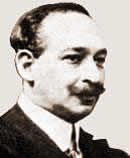
José Ingenieros
Encyclopedia

Argentina
Argentina , officially the Argentine Republic , is the second largest country in South America by land area, after Brazil. It is constituted as a federation of 23 provinces and an autonomous city, Buenos Aires...
physician, pharmaceutic, positivist
Positivism
Positivism is a a view of scientific methods and a philosophical approach, theory, or system based on the view that, in the social as well as natural sciences, sensory experiences and their logical and mathematical treatment are together the exclusive source of all worthwhile information....
philosopher and essayist.
He was born Giuseppe Ingegneri in Palermo
Palermo
Palermo is a city in Southern Italy, the capital of both the autonomous region of Sicily and the Province of Palermo. The city is noted for its history, culture, architecture and gastronomy, playing an important role throughout much of its existence; it is over 2,700 years old...
(Italy
Italy
Italy , officially the Italian Republic languages]] under the European Charter for Regional or Minority Languages. In each of these, Italy's official name is as follows:;;;;;;;;), is a unitary parliamentary republic in South-Central Europe. To the north it borders France, Switzerland, Austria and...
), and graduated from the University of Buenos Aires
University of Buenos Aires
The University of Buenos Aires is the largest university in Argentina and the largest university by enrollment in Latin America. Founded on August 12, 1821 in the city of Buenos Aires, it consists of 13 faculties, 6 hospitals, 10 museums and is linked to 4 high schools: Colegio Nacional de Buenos...
School of Medicine in 1900. Ingenieros was philosophically influenced by Herbert Spencer
Herbert Spencer
Herbert Spencer was an English philosopher, biologist, sociologist, and prominent classical liberal political theorist of the Victorian era....
and Auguste Comte
Auguste Comte
Isidore Auguste Marie François Xavier Comte , better known as Auguste Comte , was a French philosopher, a founder of the discipline of sociology and of the doctrine of positivism...
, and wrote a very important philosophical and social thought, "El hombre mediocre" (The Mediocre Man), in 1913. Ingenieros founded the Buenos Aires
Buenos Aires
Buenos Aires is the capital and largest city of Argentina, and the second-largest metropolitan area in South America, after São Paulo. It is located on the western shore of the estuary of the Río de la Plata, on the southeastern coast of the South American continent...
Institute of Criminology
Criminology
Criminology is the scientific study of the nature, extent, causes, and control of criminal behavior in both the individual and in society...
in 1907 and the Argentine Psychological Society in 1908; he was elected President of the Argentine Medical Association in 1909.
Ingenieros married Eva Rutenberg, from Lausanne
Lausanne
Lausanne is a city in Romandy, the French-speaking part of Switzerland, and is the capital of the canton of Vaud. The seat of the district of Lausanne, the city is situated on the shores of Lake Geneva . It faces the French town of Évian-les-Bains, with the Jura mountains to its north-west...
, in 1914. Appointed Assistant Dean of the School of Philosophy and Letters of his alma mater, he played a prominent role in the landmark University reform in Argentina, in 1918. He resigned his academic posts in 1919 to join Claridád, a communist organization, and in 1922, formed Unión Latinoamerica, a political action committee
Political action committee
In the United States, a political action committee, or PAC, is the name commonly given to a private group, regardless of size, organized to elect political candidates or to advance the outcome of a political issue or legislation. Legally, what constitutes a "PAC" for purposes of regulation is a...
focused on anti-imperialism
Anti-imperialism
Anti-imperialism, strictly speaking, is a term that may be applied to a movement opposed to any form of colonialism or imperialism. Anti-imperialism includes opposition to wars of conquest, particularly of non-contiguous territory or people with a different language or culture; it also includes...
. He founded a monthly, Renovación, in 1925, but died in Buenos Aires
Buenos Aires
Buenos Aires is the capital and largest city of Argentina, and the second-largest metropolitan area in South America, after São Paulo. It is located on the western shore of the estuary of the Río de la Plata, on the southeastern coast of the South American continent...
later that year.
Source
- Encyclopedia AmericanaEncyclopedia AmericanaEncyclopedia Americana is one of the largest general encyclopedias in the English language. Following the acquisition of Grolier in 2000, the encyclopedia has been produced by Scholastic....
(United StatesUnited StatesThe United States of America is a federal constitutional republic comprising fifty states and a federal district...
: Encyclopedia Americana Corporation, 1969 edition), pg 172

